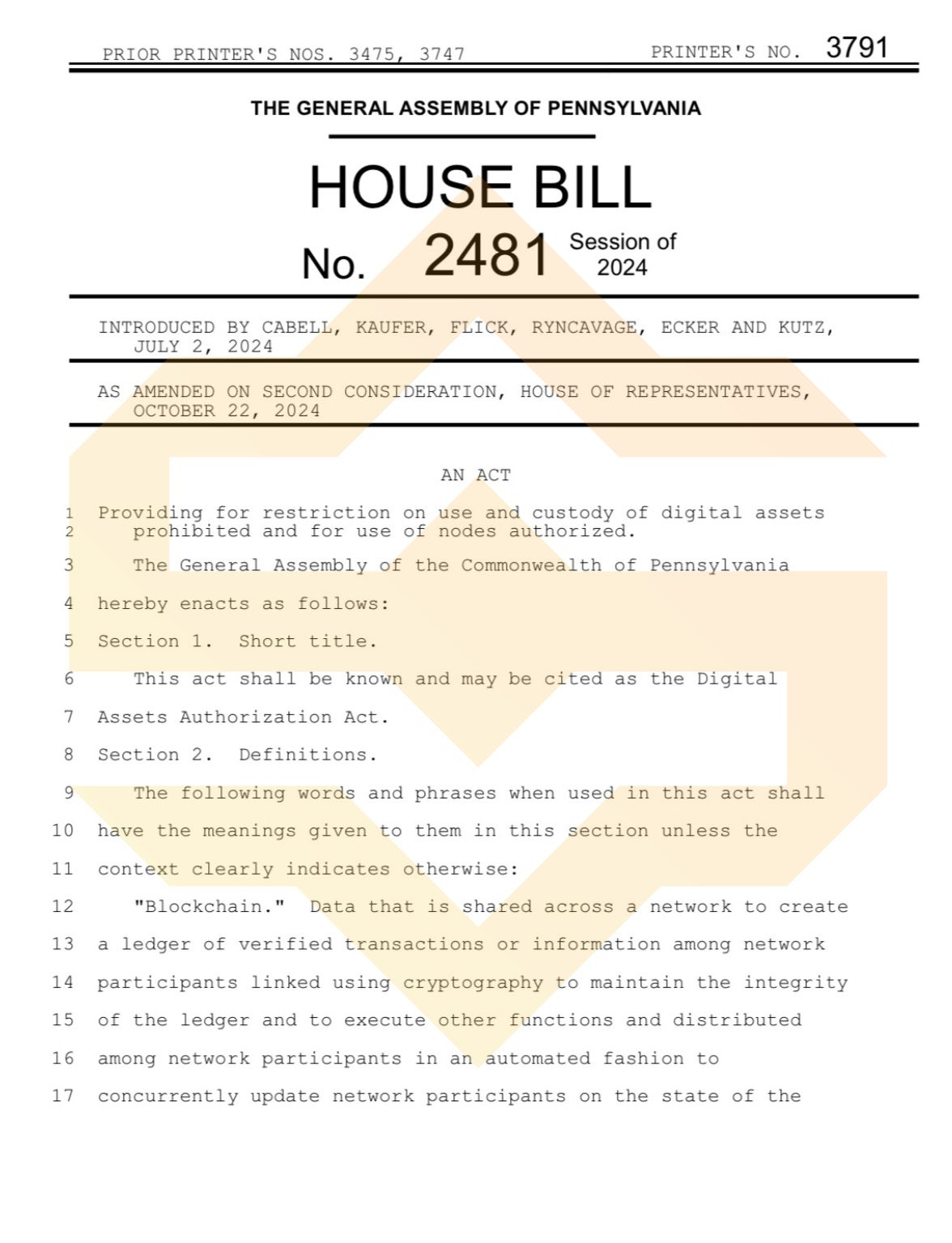A pop-up city transitioning to permanence shows how individuals can come together to create thriving, self-governing societies without government intervention. This transformation showcases the potential of decentralized, bottom-up initiatives to foster freedom and innovation.
⚡Top of the Agenda
Pop-up city Edge Esmeralda begins to take permanent root in Cloverdale
Pennsylvania passes Bitcoin Rights while Europe is stuck in the past
LEADING STORIES
1. Pop-up city Esmeralda Begins to take permanent root in Cloverdale
Edge Esmeralda was a 30-day pop-up community. It was so successful that its organizers decided to turn the same idea into a permanent town called Esmeralda, announced on X by Devon Zuegel, who is running the show.
Edge Esmeralda was organized in Healdsburg, California, to demonstrate the viability of a new kind of intentional community (a group of people that live together based on shared values, with a propensity for action). The successful prototype in June 2024 attracted 1,300 participants and paved the way for the beginnings of Esmeralda, a permanent development.
The proposed permanent site lies in the picturesque Exlander Valley AVA, surrounded by vineyards and beautiful hills in Cloverdale, just 15 minutes from the original pop-up location and 90 minutes north of San Francisco, a major economic hub. The 266-acre property is already approved for development.
Using a step-wise commitment approach, beginning as a temporary community and gradually evolving that into a permanent settlement, ensured organic growth and community buy-in.
Drawing inspiration from the historic Chautauqua in New York, where Thomas Edison and Henry Ford once summered, Esmeralda aims to recreate the magic of the place where Edison himself installed his first signature light bulb. This rich heritage of innovation continues to guide the project's vision.
The initiative is structured through two entities: The Esmeralda Institute, a 501(c)3 nonprofit focused on lifelong learning, and the Esmeralda Land Company, a for-profit development enterprise backed by value-aligned investors.
The development prioritizes a University campus-style setup that places learning, creativity, and authentic social interactions at its core. The pedestrian-friendly design promotes an active lifestyle and natural community engagement.
Five key values guide the project: multi-generational buildings, pedestrian and cyclist infrastructure, lifelong learning, nature, and health.
Current status: The Esmeralda Land Company has secured a Purchase and Sale Agreement for the property and has garnered strong support from Cloverdale's leadership, including the City Manager, Mayor, and council members.
The development promises to address Cloverdale's $1 million structural budget deficit through substantial property tax and Transient Occupancy Tax revenues, while creating new jobs and attracting investment to the city.
More info
The project has received overwhelming local support, with hundreds of encouraging messages and strong YIMBY (‘Yes In My Back Yard’ — a permissive attitude to things being developed in your local rea) sentiment from community members eager to contribute ideas and participate in the development process.
For updates on the city’s progress, fill in the form here so they can keep you posted.
2. Pennsylvania passes Bitcoin Rights
Pennsylvania, a swing state, saw both Republicans and Democrats vote for “Bitcoin Rights”, ensuring the right for people to:
Hold their Bitcoin in self-custody, and
use Bitcion as a payment.
This is important, because, as Dennis Porter, a prominent Bitcoiner, explains:
Pennsylvania is a critical swing state in presidential elections, holding 19 electoral votes.
The state has been highly competitive, with narrow margins in the 2016 and 2020 elections.
Support for Bitcoin transcends traditional party lines, appealing to voters who value economic freedom, technological innovation, and digital privacy.
Pennsylvania's election can be decided by a small fraction of the electorate, making Bitcoin a potential deciding factor.
It paves the way for other states to pass the same legislation.
Meanwhile in Europe..
Europe struggles to innovate, and also actively struggles against innovation: the European Central Bank released a paper saying, essentially, that Bitcoin is bad.
Here is a rebuttal paper, written by, among others, Dennis Porter, on whom we just relied to explain the significance of the breakthrough in the US, that addresses the points raised by the ECB.
Points Raised by the ECB authors:
Crypto industry lobbying has disproportionate influence, enabling speculative behavior.
Bitcoin wealth is highly concentrated, posing risks of market manipulation.
Bitcoin's rising price doesn't contribute to economic productivity and benefits early adopters.
Rebuttals:
Lobbying by the crypto industry seeks regulatory clarity, not absence of oversight, and is still dwarfed by traditional finance.
Bitcoin ownership is more dispersed than perceived, with large wallets often belonging to exchanges representing many users.
Bitcoin drives a ton of technological innovation, offers a store of value —especially as its price becomes higher and more stable— and its price reflects market recognition of its unique properties.
Have fun staying poor, Europe.
Other stories
What is going on with Próspera?
Próspera launches Próspera Africa, led by Magatte Wade. Though it’s as of yet unclear what the plans are in Africa, it’s good they’re branching out as its Honduran sister project is still in purgatory, and under attack, as ..
the socialist government shut down a building, which was the office to a business in Próspera, protecting almost 40 Honduran workers from their own jobs, as well as ruining their chances of getting another one anytime soon: as Próspera writes:
“These aggressive actions mirror the authoritarian tactics of Chávez at the height of his power in Venezuela, which scared away investors and triggered economic collapse. The Municipality is taking actions similar to those taken by radical elements of the current administration in Tegucigalpa that is driving out Foreign Direct Investment (FDI) and causing major companies to close and take their capital out of the country. “
Vitalia City, a project that exists within Próspera ZEDE in order to promote biotechnological advances, is also trying to fight for its life, and wrote a letter to the Supreme Court.
If you’re keen to learn about the details of ZEDEs, the freedom zones that make Próspera possible, there is a new book on the topic: Pioneering Prosperity by Joyce Brand, an author who lives in another ZEDE: Ciudad Morazán, and likes it there.
Good governance matters
Economist Bryan Caplan reflects on his trips to the United Arab Emirates, which he visited on a layover to his real destination: India.
Citations from his reflections on the UAE:
“Per-capita, UAE is the most amazing country I’ve ever seen.”
The UAE has open borders to anyone they deem useful: “Sheik Zayed bin Sultan Al Nahyan, founder of the UAE, had the brains and vision to follow the opposite of the nativist strategy. Why make your citizens leave their homeland to consume their riches, when the world is full of poor foreigners who are eager to move to you? A typical demagogue would have objected, “We don’t want to become a minority in our own homeland,” but Zayed boldly forged ahead — and created a cruise ship the size of a country. Since 1971, UAE’s population has grown from 280K people to 9.5 million. A miraculous multiple of 34x.”
and from his reflections on India:
“India is by far the poorest country I have ever visited. While I am well-aware that life in India has drastically improved since 1991, the poverty that remains is still pretty horrifying.”
“OK, so why is India still so poor? All libertarian bias aside, India’s central problem is absurd regulation and state ownership. Absurd how? To start: The Indian government strictly protects legal employees, so 90%+ of Indians work “informally.” Our bus driver to Agra was required to take a rest stop every two hours — in a country packed with tuk-tuk drivers zooming around like maniacs. The government caps the maximum size of farms — and bars foreigners (including Non-Resident Indians!) from owning farms at all. A great way to strangle the food supply and impoverish farmers at the same time. The Indian government also crushes construction, most notably with its infamous Floor Area Ratio regulation — in a country where plenty of people sleep on the streets. Developers aren’t even allowed to build skyscrapers in slums — and housing prices in major cities rival those in top Western cities. What about state ownership? Locals told me that private Indian schools cost parents one-tenth as much as public Indian schools cost taxpayers.”
Musk is forced to kidnap baby seals and torture them, per US regulation, so the noise from his rockets won’t upset the seals too much. We couldn’t make it up.
What has Milei been up to?
The Argentine president closed the dreaded tax agency “Administración Federal de Ingresos Públicos” (AFIP) and replaced it with an agency carrying a different name “Agencia de Recaudación y Control Aduanero” (ARCA), that does the same thing, but requires fewer people to staff it.
Can the 10th time be the charm? Argentina to pay back $14bn by 2025 (paywalled). Economic minister Luis Caputo says that, after Argentina’s 9-times-in-a-row defaulting on its debt, they’re definitely going to pay this time!
A new report on Milei in the FT cites a beautiful characterization of Argentine’s attitude towards their Libertarian leader, who still boasts a 44% approval rating amidst bleak austerity and record high poverty: “Let the madman get on with it”.
“The worst is now past,” according to the boss himself. Let’s hope so.
Surveillance
“The City of Norfolk, Virginia, has installed a network of cameras that make it functionally impossible for people to drive anywhere without having their movements tracked.” a civil liberties organization filed a lawsuit, arguing that this is unconstitutional.
City Building
Why do some areas of Japanese cities look so much fun, while also allowing for plenty of calm neighborhoods? Noah Smith explains how multi-purpose “zakkyo” buildings can concentrate a lot of commerce into a small area.
New Events
Praxis Nation is organizing a meet-up in Mumbai on October 26th.
Interesting Media & Content
Phil Zimermann, a pioneer in privacy, and the originator of PGP (Pretty Good Privacy), a widely used encryption program, sits down with privacy afficionado Naomi Brockwell on her new podcast.
Upcoming Events
Ongoing: The Network School, Near Singapore: September 23 - December 23, 2024.
Zelar City, Berlin, Germany: October 5th - November 17th, 2024
Edge City Lanna, Chang Mai, Thailand: October 10th - November 10th, 2024.
The Network Society Camp, Austin, TX, United States: 11 - 14 October, 2024.
Crypto City Builders - Exploration Program, Próspera ZEDE, Roatán, Honduras: October 19th - November 25th, 2024.
Crypto Cities Summit, Próspera ZEDE, Roatán, Honduras: 26 - 27 October, 2024.
Liberty in Our Lifetime, Prague, Czech Republic: 1 - 3 November, 2024.
Arkham x Praxis Campus, Dominican Republic: 5 - 8 November, 2024.
ZuGarden, Bangkok and an Island in Thailand: 10 - 30 November, 2024.
Adopting Bitcoin, San Salvador, El Salvador: 15 - 16 November, 2024.
Safe Harbor Summit, Vitalia City, Próspera ZEDE, Honduras: 16 - 17 November, 2024.
Vitalia Startup Demo Day, Vitalia City, Próspera ZEDE, Honduras: November 18th, 2024.
Vitalia Forever, Vitalia City, Prospera ZEDE, Honduras: January 6th - March 3rd, 2025.
Edge Esmeralda 2025, Healdsburg, CA, USA: April 24th - June 21st, 2025
See based.guide’s event page for all events.




